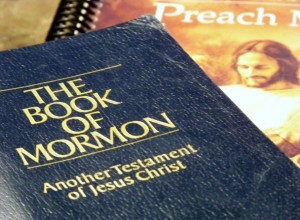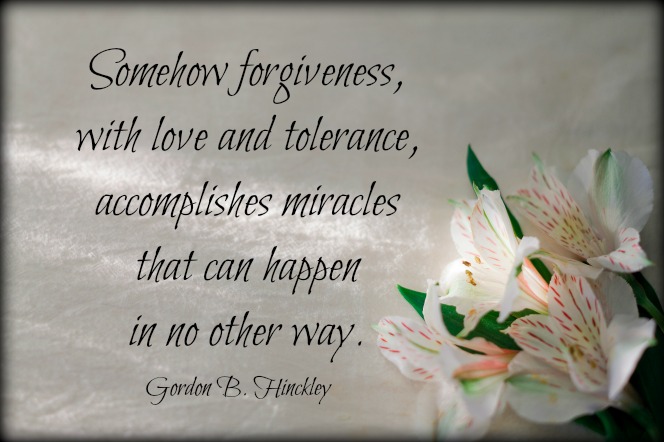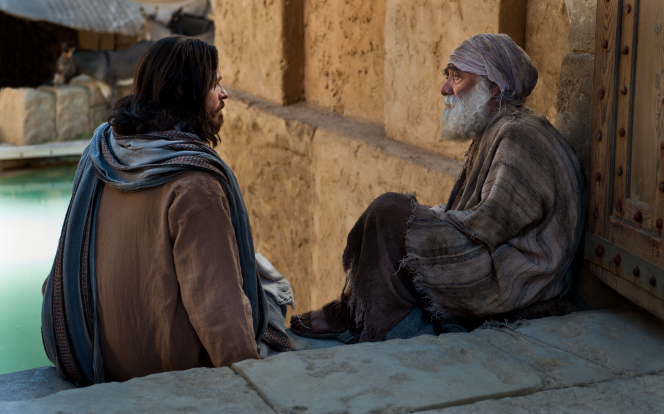Most people, including members of The Church of Jesus Christ of Latter-day Saints, don’t anticipate having to visit their spouses behind bars. It’s just a foreign concept for us. Unfortunately, we are all human, and we all make mistakes. And, as one woman said, some people’s mistakes are bigger and more visible than others.
My friend who said this has firsthand experience with high-profile errors, because her husband is serving time in federal prison on a case that was well-publicized in their former community. He is appealing his conviction. The husband of another friend of mine is also incarcerated, and his case is winding through the legal system.
I am a second-hand observer to their situations, and I don’t pretend to know how they feel. But I can imagine that the road is lonely and a little scary. My purpose in writing this is to help others who might be in a similar situation see that there is light at the end of the tunnel, and they are not alone. From the experiences of these two ladies, here are 5 things to remember when a loved one is incarcerated.
1. Heavenly Father loves us, and everything will be OK in the end.
One of my friends said that, from the beginning, she needed to know that Heavenly Father loves her and her husband, and that everything would be OK. The late President Gordon B. Hinckley was fond of saying, “Things will work out.” In times of distress, sometimes it’s hard to see that.
Sister Elaine S. Dalton said:
The Lord has promised us that as we “search diligently, pray always, and be believing, … all things [will] work together for [our] good” (Doctrine & Covenants 90:24; emphasis added). That doesn’t mean that everything will be perfect or that we will not have any trials, but it does mean that everything will be okay if we just “hang in there.”
Sometimes the trials are of our own making, and sometimes they are a result of another’s choices. But if we focus on doing what’s right—or repenting of our wrongs, if need be—then, in the end, everything will be OK.
Above all, we must remember that the love of God transcends all of our weaknesses and our sins. President Dieter F. Uchtdorf taught:
God does not look on the outward appearance. I believe that He doesn’t care one bit if we live in a castle or a cottage, if we are handsome or homely, if we are famous or forgotten. Though we are incomplete, God loves us completely. Though we are imperfect, He loves us perfectly. Though we may feel lost and without compass, God’s love encompasses us completely.
He loves us because He is filled with an infinite measure of holy, pure, and indescribable love. We are important to God not because of our résumé but because we are His children. He loves every one of us, even those who are flawed, rejected, awkward, sorrowful, or broken. God’s love is so great that He loves even the proud, the selfish, the arrogant, and the wicked.
What this means is that, regardless of our current state, there is hope for us. No matter our distress, no matter our sorrow, no matter our mistakes, our infinitely compassionate Heavenly Father desires that we draw near to Him so that He can draw near to us.
My friend said that knowing everything will work out in the end, she can be OK now. Her faith in Heavenly Father’s love and guidance gives her courage to face her trial with faith. And she knows that as long as she is on the right path, that she will be OK—and so will her husband. As Elder Jeffrey R. Holland said:
On occasions, global or personal, we may feel we are distanced from God, shut out from heaven, lost, alone in dark and dreary places. Often enough that distress can be of our own making, but even then the Father of us all is watching and assisting. And always there are those angels who come and go all around us, seen and unseen, known and unknown, mortal and immortal.
Not only do these women need to know that Heavenly Father loves them no matter what, their husbands need to know that as well. And, though we might need to make some course corrections, “all things will work for our good” if we trust in Heavenly Father and try to do what’s right.
2. The situation calls for compassion and mercy, not judgment.
Easter 2013, my friend’s husband asked my husband, who was his bishop, for a blessing. His trial was coming to an end, and he and his family were scared of what the outcome would be. The Spirit was strong as my husband and other priesthood holders administered to this man. He was convicted shortly thereafter, with harsh words from the judge. However, he and his family continued to feel the peace that they felt during his blessing. I’m not trying to say that it has been easy for them, but they were comforted by the words spoken in his blessing.
It would be easy for me to pass judgment on him in this case—after all, he was found guilty. But I don’t think I have enough information to do so. And I don’t feel like I can. The Prophet Joseph Smith said:
Our heavenly Father is more liberal in His views, and boundless in His mercies and blessings, than we are ready to believe or receive. … God does not look on sin with [the least degree of] allowance, but … the nearer we get to our heavenly Father, the more we are disposed to look with compassion on perishing souls; we feel that we want to take them upon our shoulders, and cast their sins behind our backs. [Teachings of the Prophet Joseph Smith, sel. Joseph Fielding Smith (1976), 257, 240–41.]
It is for this reason that we are taught to not judge others. This concept can seem confusing. The Savior taught that we should “judge not, lest ye be judged” (Matthew 7:1). At another time, He taught that we should “judge which is right” (Luke 12:57). Elder Dallin H. Oaks clarified:
We must, of course, make judgments every day in the exercise of our moral agency, but we must be careful that our judgments of people are intermediate and not final.
In other words, we must decide if a person’s actions are wrong, but we must not condemn the person—meaning that there is no more hope of divine forgiveness for that person. President Uchtdorf said:
I am not suggesting that we accept sin or overlook evil, in our personal life or in the world. Nevertheless, in our zeal, we sometimes confuse sin with sinner, and we condemn too quickly and with too little compassion. We know from modern revelation that “the worth of souls is great in the sight of God.” We cannot gauge the worth of another soul any more than we can measure the span of the universe. Every person we meet is a VIP to our Heavenly Father. Once we understand that, we can begin to understand how we should treat our fellowmen. …
With this in mind, let our hearts and hands be stretched out in compassion toward others, for everyone is walking his or her own difficult path. As disciples of Jesus Christ, our Master, we are called to support and heal rather than condemn.
We don’t always know the thoughts, intents and struggles of another person, and we don’t always know what is in his or her heart. But the Savior does. That is why those who are incarcerated—and the loved ones they left behind—need love, support and encouragement instead of judgment.
President Henry B. Eyring told a story about a friend’s grandmother who had a wayward grandson. This grandson chose a life of crime and eventually was sent to prison. President Eyring said:
My friend recalled that his grandmother, as she drove along a highway to visit her grandson in prison, had tears in her eyes as she prayed with anguish, “I’ve tried to live a good life. Why, why do I have this tragedy of a grandson who seems to have destroyed his life?”
The answer came to her mind in these words: “I gave him to you because I knew you could and would love him no matter what he did.”
There is a wonderful lesson for us all. … Heavenly Father and His Beloved Son love all of God’s children no matter what they choose to do or what they become. The Savior paid the price of all sins, no matter how heinous. Even though there must be justice, the opportunity for mercy is extended which will not rob justice.
(Maybe it’s just me), but I always thought that the prisons were full of bad people who deserved to be there. Through this experience I have realized that although some might deserve to be there, that doesn’t mean that they are bad people. President Uchtdorf said:
In truth, we “all have sinned, and come short of the glory of God.” We are all in need of mercy. In that last day when we are called to the judgment bar of God, do we not hope that our many imperfections will be forgiven? Do we not yearn to feel the Savior’s embrace?
It seems only right and proper that we extend to others that which we so earnestly desire for ourselves.
3. The Church of Jesus Christ offers resources for those who are incarcerated.
 When my friend’s husband was arrested nearly two years ago, they wondered how they could get him scriptures, a subscription to the Ensign magazine or other materials from The Church of Jesus Christ. At least in the experiences of my friends, inmates are only allowed to have soft-cover books that come directly from the distributor.
When my friend’s husband was arrested nearly two years ago, they wondered how they could get him scriptures, a subscription to the Ensign magazine or other materials from The Church of Jesus Christ. At least in the experiences of my friends, inmates are only allowed to have soft-cover books that come directly from the distributor.
But the Church does offer resources for those who are incarcerated:
In collaboration with Welfare Services at church headquarters, LDS Family Services is responsible for materials and professional resources to assist those in correctional institutions and their families. For assistance, contact LDS Correctional Services at 800-453-3860, ext. 2-2644, or [email protected].
In addition, some corrections institutions have bishops assigned to assist members there. When permitted, The Church of Jesus Christ will organize programs and other services at facilities—including worship services with prayers, talks and fast and testimony meetings. The sacrament is not administered, but the Spirit of God is often there. S. Brent Scharman, who has served as an ecclesiastical leader in correctional institutions, wrote:
I have come to discover that prisons are places of paradox: harshness combines with opportunities for spiritual growth. I’ve had the chance to observe what happens when inmates choose to participate in the Church where it is available. …
I’m not sure I’ve ever felt the Spirit more strongly than in a meeting where approximately 100 inmates were celebrating Easter. The choir was surprisingly capable and demonstrated genuine emotion and sincerity. Inmates gave from-the-heart testimonials about their need for the Savior’s help in bringing about real change. The feelings in the meeting that day were of hope, optimism, and love.
4. The power of forgiveness and the Atonement are real.

One of the most comforting doctrines for those whose loved ones are incarcerated is that of forgiveness and the Atonement. President Boyd K. Packer said:
… Save for the exception of the very few who defect to perdition, there is no habit, no addiction, no rebellion, no transgression, no apostasy, no crime exempted from the promise of complete forgiveness. That is the promise of the atonement of Christ.
The gospel of Jesus Christ is a message of hope, even when all seems lost. To claim the blessings of the Atonement, we must repent of our sins. President Uchtdorf taught:
True repentance brings us back to doing what is right. To truly repent we must recognize our sins and feel remorse, or godly sorrow, and confess those sins to God. If our sins are serious, we must also confess them to our authorized priesthood leader. We need to ask God for forgiveness and do all we can to correct whatever harm our actions may have caused. Repentance means a change of mind and heart—we stop doing things that are wrong, and we start doing things that are right. It brings us a fresh attitude toward God, oneself, and life in general.
The Atonement of Jesus Christ is what makes this possible. President Packer said:
Your repentance cannot be accepted unless there is a restitution. If you cannot undo what you have done, you are trapped. It is easy to understand how helpless and hopeless you then feel and why you might want to give up….
…Restoring what you cannot restore, healing the wound you cannot heal, fixing that which you broke and you cannot fix is the very purpose of the atonement of Christ.
When your desire is firm and you are willing to pay the “uttermost farthing,” the law of restitution is suspended. Your obligation is transferred to the Lord. He will settle your accounts.
Repentance is available to all, even to those who are serving time in prison or jail. President Hinckley said:
I know this is a delicate and sensitive thing of which I am speaking. There are hardened criminals who may have to be locked up. There are unspeakable crimes, such as deliberate murder and rape, that justify harsh penalties. But there are some who could be saved from long, stultifying years in prison because of an unthoughtful, foolish act. Somehow forgiveness, with love and tolerance, accomplishes miracles that can happen in no other way.
My friend sees one of these miracles in her husband’s life. He is pleading guilty in his case. My friend said to me after one of his hearings, “I am so grateful that the prosecutor isn’t out to destroy my husband. She’s trying to be fair, but she’s not trying to ruin his life.” Mercy cannot rob justice. But sometimes, in the pursuit of justice, we can find mercy as well.
5. We can be an instrument in the Lord’s hands wherever we are.

President Uchtdorf told a story several years ago about a group of men who were trying to move a grand piano. The men tried all sorts of configurations but could not get the instrument balanced enough to move it safely. Finally one man suggested that they all stand close together and lift where they were standing. President Uchtdorf said:
Although it may seem simple, lifting where we stand is a principle of power.
My other friend and her husband are amazing examples of this principle. From the beginning, her husband has befriended and worked to help and lift his fellow inmates. At times he has also enlisted his wife’s assistance in aiding other inmates and their families.
She said that she often receives texts from former inmates. One said, “Tell your husband that I’m praying every night and reading my scriptures.” Another said, “Tell your husband that I’m doing fine and I’m going to church.”
As ironic as it sounds, she and her husband feel that he has been called on a mission to prison. Elder Oaks said:
… The Final Judgment is not just an evaluation of a sum total of good and evil acts—what we have done. It is an acknowledgment of the final effect of our acts and thoughts—what we have become.
While he is appealing his conviction, my friend’s husband is working to help others realize what they can become. Both of my friends are also lifting where they stand. First and foremost, they love and support their husbands and continue to see the good in them—even when others don’t. Both women are strengthened by their faith in Heavenly Father and the knowledge that their families are bound by temple covenants.
Although they are dealing with their own trials, they are reaching out to others around them. One friend said, “I feel like I have been so blessed throughout this trial that I just want to be helping and serving others whenever possible.”
They are both examples of this quote by Elder Holland:
May we all believe more readily in, and have more gratitude for, the Lord’s promise as contained in one of President Monson’s favorite scriptures: “I will go before your face. I will be on your right hand and on your left, … my Spirit shall be in your [heart], and mine angels round about you, to bear you up.” In the process of praying for those angels to attend us, may we all try to be a little more angelic ourselves—with a kind word, a strong arm, a declaration of faith and “the covenant wherewith [we] have covenanted.” Perhaps then we can be emissaries sent from God when someone … is crying, “Darkness … afraid … river … alone.”







I have two part questions 1.if a person walk in a church today,who had been locked up for25 years. Who do the church supposed to treat them? 2.what can we do to help them?
Typo how
My husband was released from jail last year. Although his time there was tough on both of us, miracles truly happened. He entered disabled and left having run a half marathon! At the same time he followed a personal prompting to distribute 100 copies of the Book of Mormon. Everything that happens in life does so for a reason and the blessings of his incarceration are too many to put into a paragraph here. Since he left he has not faced discrimination but acceptance and love from his fellow saints.
What an excellent article. It is not always easy to remember to be compassionate and merciful when pain is in the equation. Thank you so much for the reminder.
My ex-husband had me arrested for something I did not do and it was a very frightening experience. It took time but eventually, I was able to prove my innocence. I now look at him and think how sad he is. I have forgiven him and think how sad my life would be if I held a grudge and was angry. We now have a son serving time in prison and I make sure that I let my son know that I love him. I write him, visit, send cards, magazines, books whatever I can do to let him know he is loved. I belong to a group that writes inmates and sends Christmas and birthday cards and we support each other through our trials with the prison system. There is hope and help out there for everyone.
My husband and I have served at a prison for the last 2 yrs. as the FHE specialists. It is far and wide the best and most rewarding calling I have ever had in my 40 yrs. as a member of the LDS church. The men who come regularly to our meetings are sincerely motivated to live the gospel to the best of their ability and do a lot of missionary work within the prison. Through some inspiration we have received there has been a great increase in the feeling of brotherhood among the men in our group. So much so that other religious groups have mentioned it. They respond so well to support from their families and close friends. I wonder if their loved ones realize how much any kind of contact means to these men. We are not allowed to know anything about their crimes or reasons for incarceration so it’s easy to accept them as we would any church member we are acquainted with. It’s been a great blessing for all of us to be in this “church family” together.
I have a picture in my mind of those visiting their loved ones in jail. I wanted to hold on to the walls for support and cry it all away. Then, as I was leaving I saw a young woman ( I suspected her to be a young wife) doing just that. I wanted to hug her and cry with her, but I let my initial shyness and her possible need for privacy from a stranger hold me back.
In Relief Society my ward started a tradition of announcing their blessings from the previous week. Many announced grandchildren born, this and that, this and that. I loved my ward but I didn’t confide my joy when my son achieved the status that allowed him to leave the jail a few hours a day for a job. I didn’t announce our joy when he was released. What a tremendous blessing to allow him the chance to fully repent and start new.
Once, in our writing class we were supposed to write out the annual Christmas letter telling all the wonderful achievements of our family in the past year….I mentioned my sons incarceration…the class loved it – but of course looked at it as a joke…
I was able to support my son with his progress in the jail system, I try to still support him now that he is out. We can all support each other with the true, pure love of Jesus Christ which is merciful and free and enjoyed by our continuous love and forgiveness for each other.
My friend was recently released from prison after serving a 3 year sentence, I won’t lie what she did was terrible. I was so amazed at the out pouring of love her ward gave her. It would’ve been easy to pull away or judge but instead they knew the “worth of a soul” and let the Lord judge. She is in a great place in her life now and while in prison helped many other inmates. I have learned a great lesson about judging and how important it is to follow the teachings of Jesus and not cast stones. This ward literally helped keep her in the fold and showed her unconditional love. We need always remember to embrace those who are struggling, the influence we have on people can be eternal.
While serving as a Stake President I had the Privilege of visiting inmates in a Federal Correctional institution. I can testify that I personally felt a great deal of love for those good brethren and I can also testify that I felt the Lord’s love for them as well. They were good men for the most part who had made very serious mistakes. Who of us has not made mistakes and sinned. I know most of them will pay their debt, get out of prison and make substantial contributions to society. I would welcome them as my brother any day. The same would be true of sisters who make terrible mistakes. God bless them and especially their families.
This is a wonderful article. I have been a prison volunteer for nearly nineteen years. It started with a church calling and then expanded to other programs. I have seen many changes among men that society has given up on. Some of them were never members of the church. My prison calling was the greatest calling I have ever had the privilege of serving, and that is why I continue beyond the calling. As a prison volunteer, I am so grateful for the family members that support their incarcerated loved one. It does take extra strength, but the Lord stands ready to give that strength.
I sure enjoyed reading your article. I found comfort in reading about what hope the gospel and the atonement bring to our lives. I had a cousin who was in jail for 5 years and he was a big instrument in teaching others about the Book of Mormon. He grew spiritually while he served his time. I know that he and others are forgiven and life will work out as they follow the Savior and do what is right. Thanks again for such an uplifting article!
I, too, have missed my husband for almost a year now as he has been serving his own “mission” in a Michigan prison. We have been married for seven years and have not once turned away from Church activity despite the traumatic situation that last two years have brought. In fact, we can’t imagine our life without the Gospel. We are both very blessed and can identify greatly with all points made in your article, especially #5. He is also appealing the conviction but waiting for that decision is very daunting. We trust greatly in Heavenly Father’s will and timing and have seen miracles daily throughout this ordeal. It would be so nice to have a support group for LDS couples going through this obstacle. Thank you for taking the time to write your inspiring words and for the opportunity to connect!
Thanks for the wonderfully expressed and well researched thoughts on what to remember about someone who is incarcerated. I have just volunteered for long-term service at the Utah State Prison working with Family History. Your comments and ideas were very helpful as I consider those whom I will be serving.
Thank you so much for a wonderful article, and great insights. I have a friend whose husband was just released from prison – his spiritual growth there was amazing. Thank you again!
I appreciated your well put together article. As a parent of a jailed convict we have had to depend on our prayers, blessings and support from family and friends both in and out of the church . We were disappointed that it took many months and many requests to finally have a member visit the jail. As we had to face the reality of what happened the blessing we had helped to strengthen our foundation so we could face whatever was going to happen with faith in The Lord. Thank you again for the spirit of love and understanding you bring to this heartbreaking situation.
I am the mother of an inmate. I too have made many requests for him to be visited, but to no avail. Those in areas with sizeable LDS populations are blessed to have inmate support!
My brother served 3 years in prison. It took a long time for his trial to start, but when it happened, he was frank about it. I tried not to judge him during everything. I felt bad for him, but I also knew justice had to be served. I wrote to him frequently while he was there. My hope was to uplift him as much as possible. Interesting enough, my sister, who left the church, was very judgmental towards the situation and wanted nothing to do with him again. She changed a little bit with that though.
I too an aware of how it feels to have your LDS husband incarcerated. After his excommunication I was still comforted in the fact that I still have my temple recommend and I will do anything to KEEP it! Having him gone for almost a year now and to think about being without him for the next 2 or 3 yrs I can only find comfort in the everyday things. Depression and anxiety seem to creep in especially when I think about how far away that feels. Fear of what others will think about me staying with him and supporting him can be debilitating, but I try not to go there anymore. Thank you for sharing! I am VERY grateful for my friends, family and neighbors who have prayed and helped my little family in more than one way! It helps to know people are praying for you! It seems to sustain you just one more day! 🙂 It would be nice to have an LDS incarcerated-loved-one support group!
I am just 2 days away from the day my husband was arrested. I fully understand what it is like to have one’s husband incarcerated. It had been an especially lonely road with little to no support. With our Father’s help, I have learned what true forgiveness is. How to love greater regardless of my husband’s sin/crime.
This article is perfect timing for my needs. Thank you for your words and considerate thoughts.
Hi Marianne-
I completely know how you feel about fear of others judging you. This is a very lonely path we choose to take because we know the worth of a soul is great. And our husbands’ souls are so linked to our own in a way we can’t put into word or feeling for others to understand. Keep at it! It will be worth it.
Thank you Marianne for your comments on this well-written article. I am a mother of two sons that have been or are in prison. One has since committed suicide and one is a returned missionary. A lot of people believe prisoners have the good life (I have heard this many times from well-educated people) as they have free home and board, free medical, free education and can spend and can relax watching TV all day. This is not true. Many prisoners are required to work (our state pays .25 to.65 cents a day and you are lucky to get $1 a day. They have to pay for stamps, pen and paper, doctor visits and sometimes medication not to mention decent shoes to wear. Stamps are valuable and are the prisoner’s money. You pay other inmates via stamps to pay for the right size of clothes, haircut tips to get a decent cut without nips and many other required items. So family members and friends have to send them money on a regular basis. Many states have limited funds and no longer have colleges (4-year) classes available. You will find most prisoners have a 6th grade education. And forget about your son getting any help from doctors, wardens and caseworkers when your son prepares to commit suicide. My son’s caseworkers laughed at my phone calls. When you are able to visit, your heart and stomach ache before you visit, then you are happy and you may be happy when you leave but you are exhausted. Many LDS prisoners do not receive any LDS services (they are denied). After 4.5 years of fighting for visits and services with the local ward/stake, my son transferred and had a local Bishop come visit, he cried and cried with happiness. He would be the first person to tell you that prison was the best thing that happened to him. (He and his brother were abused by a local babysitter’s family as children). After atoning for your sins and become a better person, you still have a fear that LDS people do not believe you are human or will never be accepted as a human being.
My (RM= returned missionary)son has helped many prisoners convert. He has asked for my help to research genealogy lines for others. I cannot express for these souls the love and appreciation to find and receive paper family trees. For the first time in their lives they feel loved. And these are dead family members. So many never ever have family or others visit them and then suddenly they have the dead keep them company as they treasure this information. And they feel the love from their ancestors. There are many helpful stories and testimonies that can be shared by stakes having support groups of family members of incarcerated relatives. This can not only help each other but our leaders need to attend regularly to learn and help us and others and especially LDS members that need to learn not to judge and to be Great Home and Visiting teachers. Thank you….
good idea!
Your trials are overwhelming to me. Your strength through them is amazing. Always stay faithful.
Marianne,
I to have a husband that has been incarcerated and I agree that there needs to be support for those left outside. In my experience I have people full of care and concern for me and my family, but few if any know the depth of suffering that we have experienced, if nothing else, having someone of the same faith that can relate to our experiences, that can share insight and encouragement would be a cherished blessing. if you’d ever like to talk let me know. I’d love to share this journey with you “)We can start our own group!!!
Melissa
I have experienced this ordeal first hand my son was incarcerated for 6 years. We went to several different facilities over that time period. Some better than others. It was heart breaking, as a mother the worst thing for me was leaving my sweet boy in a place that that. I didn’t see the man who had committed a crime, I saw the sweet baby I held and rocked to sleep, the little boy who held my hand as I walked him to school. The teenager who told me he loved me a hundred times when I made his favorite dinner. As I looked around at the other men sitting with their families especially those whose mothers were there I knew their mothers felt the same way about them. So many reason why they were all locked up, but one thing occurred to me, that Heavenly Father saw them first and foremost as his beloved sons. It is not our job to judge them only to love them. When my son was released he came home for a short time until he got his life together. The family pulled together to help him understand we love him and don’t care what he’s done in the past everyday is a new day with opportunities to succeed and make good choices. Have all his choices been good since, no but then whose are. Love and time heal all wounds.
I really appreciated this article for several reasons. I had the opportunity to visit some prisons while on my mission, and while not everyone feels guilty for what they have done, there are many who do. After my mission I worked at a Mormon bookstore (not DB) and several customers, not many, would place orders through me for their loved ones in prison because they knew I would be quiet about it, but that I also would not judge. I never knew why their loved ones were in prison, I never asked. But they trusted me to help them through a difficult experience.
If we can all do that, things in life would go much smoother.
Thank you for a timely and well thought out article. I know several people in Jail or Prison. I am Bishop of one of them. Until today, I was not aware of any outreach effort by the church, but in the last few hours I found the information you referred to because I was trying to get a Book of Mormon to my ward member (it can’t be sent by an individual). It is no coincidence that I came across your article shortly thereafter. I have been in touch with the folks at Church HQ, who were very willing to help by sending the book. There are probably many people who don’t think about people in prison and don’t realize that there is actually an organized response by the Church. I was very pleased. Thank you for the article.
Thank you so much for writing this. My husband has been in prison for four years. One of the most difficult things for me has been that I have never met another member of The Church of Jesus Christ of Latter Day Saints who have had the same type of trial. It has really made my children and I feel alone. This has helped so much. Many of your words, quotes and scriptures brought so much comfort for what we have gone through.
We were told while my husband was in jail before his court date, when a young missionary went in to meet him that he felt he was being called on a mission. The young missionary shared with my children and I what an overwhelming feeling he got of this truth. We have seen my husband help so many and know that this is the mission our Father in Heaven has for him. Thanks again.